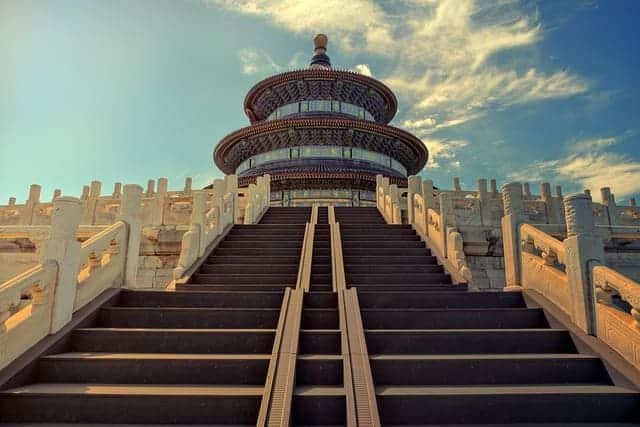Is China is cheap to visit? — Yes if you know how to travel smart. This vast and incredible country might seem intimidating at first, but it offers one of the best travel deals on the planet. Whether you’re backpacking, exploring cities, or going off the beaten path, you’ll be surprised at how much you can experience without burning a hole in your wallet. From dumplings for under a dollar to high-speed trains that cost less than a European taxi ride, this country knows how to stretch your travel budget like magic. Let’s break down exactly how and where your money can go far in China—because if you’re wondering Is China cheap to visit? you’re about to get a big, exciting “YES!”

Where Your Money Goes Far in China
Street Food is a Budget Traveler’s Dream
If there’s one thing you’ll love about China, it’s the food—and the prices. You can grab a huge bowl of noodles for under $2, juicy pork buns for $0.50, or spicy skewers for $1 each. Cities like Chengdu, Xi’an, and Guilin are packed with food stalls that sell delicious, filling meals at shockingly low prices.
In fact, one of the best ways to answer the question Is China cheap to visit? is by eating your way through its streets. Don’t skip night markets—they’re not just cheap, they’re fun, crowded, and full of energy.
Hostels, Guesthouses, and Unexpected Comfort
Accommodation is another big reason why travelers say Is China cheap to visit? Absolutely. In most cities, you’ll find clean, safe hostels for $5–$10 per night. Even budget hotels and guesthouses offer private rooms with air conditioning and hot showers for as low as $15.
Places like Dali, Yangshuo, and Lijiang offer cozy stays with stunning mountain or river views—at a fraction of what you’d pay elsewhere.
Transport That Saves You Both Time and Money
Don’t be scared of the size of China—its transportation system is fast, reliable, and surprisingly affordable. High-speed trains connect almost every major city. You can travel from Beijing to Shanghai (a 5-hour trip) for about $40. Buses and subways cost just cents in most cities. In many towns, you can rent a bike for the entire day for less than $3.
If you’ve been asking Is China cheap to visit? the transportation system alone could make you say yes. Long-distance sleeper trains can save you the cost of a hotel night, and budget airlines offer domestic flights for under $50.
Top Cities to Visit Without Breaking the Bank
Xi’an – Ancient Capital, Modern Prices
Xi’an is home to the famous Terracotta Army, and you’d think that would make it expensive. Nope. You can see these ancient warriors for about $20. The city wall, Muslim Quarter, and pagodas are either free or super affordable. Street snacks here will cost you less than $1 each, and you can bike the entire ancient city wall for just a few bucks.
Chengdu – Home of Pandas and Hotpot
Want to see real-life pandas without a zoo ticket that costs a fortune? Chengdu’s panda research base is just $8 to enter. Plus, Chengdu’s public transport is cheap, fast, and well-organized. You can eat spicy Sichuan hotpot for under $10 (and that’s if you splurge).
Chengdu is chill, green, and insanely affordable. It’s a must-visit for anyone wondering Is China cheap to visit?—because here, everything is both affordable and adorable.
Guilin and Yangshuo – Nature on a Budget
Cruise down the Li River for about $15 and watch karst mountains rise from the mist. Then spend a few nights in Yangshuo, biking through rice fields, hiking moon-shaped hills, and enjoying riverside cafes where coffee is just $2. The countryside in China offers big adventure for tiny prices.
Best Budget-Friendly Activities Across China
Hiking the Great Wall (Without the Crowds)
You don’t need a pricey tour to experience the Great Wall. Skip the popular Badaling section and head to Jinshanling or Gubeikou. Entrance is about $7–$10, and you can hike for hours in peace. Bring snacks, take a local bus, and you’ll spend less than $20 for a once-in-a-lifetime experience.

Explore Temples and Palaces for Under $5
China is full of stunning temples, gardens, and palaces that cost next to nothing. The Summer Palace in Beijing? $5. The Yungang Grottoes in Datong? $10. The Confucius Temple in Qufu? Around $6. Culture doesn’t come cheaper than this.

Travel Overnight and Save Big
Take overnight trains or sleeper buses to save on both transport and accommodation. A hard sleeper bunk on an overnight train from Beijing to Xi’an costs about $25. That’s your bed and ride covered in one.
If you’re still asking Is China cheap to visit? after hearing this, the answer is written all over your savings.
How to Keep Costs Low While Traveling in China
Get a Local SIM Card
Wi-Fi is available in many places, but getting a local SIM card (about $5–$10) with cheap data helps you book transport, find directions, and translate menus without wasting time—or money. Apps like WeChat Pay and Alipay can be used for almost everything, even from a street vendor.
Avoid Tourist Traps
Avoid fancy Western restaurants, overpriced souvenirs at tourist spots, and private taxis. Stick to local spots, use public transport, and bargain at markets (it’s expected!). When shopping, always ask for a lower price unless it’s a fixed-store.
Travel in the Shoulder Season
Visit in spring (April–June) or fall (September–November) for smaller crowds and better deals on hotels and flights. During Chinese New Year and summer holidays, prices jump and places get packed.
Learn Basic Chinese Phrases
Learning a few key phrases will save you time and money. Saying hello, thank you, how much, and where is the bus/train will go a long way. Locals appreciate the effort and may even help you get a discount.
Budget Breakdown: A Day in China for Less Than $30
If you’ve been wondering Is China cheap to visit? here’s a sample budget that proves it:
- Breakfast: Street baozi (steamed buns) and soy milk – $1
- Transport: Metro and bus rides – $1
- Attraction Entry: Temple or museum – $3–$5
- Lunch: Noodles and tea – $2
- Afternoon coffee/snack: Milk tea – $1.50
- Dinner: Hotpot or dumplings – $5
- Accommodation: Hostel bed or budget guesthouse – $10–$12
- Total: Around $25 for a full day of food, fun, and rest.
Off-the-Beaten-Path Places That Are Easy on the Wallet
Dali – Old Town Vibes Without the Prices
This lakeside town in Yunnan province offers charming stone streets, cafes, and incredible hiking—all without the city prices. Rent a scooter, ride around Erhai Lake, and enjoy peaceful village life on a shoestring budget.
Zhangjiajie – Avatar Mountains on a Budget
The jaw-dropping pillar mountains that inspired the movie Avatar are found here. Entry to the park is under $30 for four days of exploration. Local buses are cheap, and guesthouses offer home-cooked meals that are both cheap and unforgettable.
Harbin – Ice City Wonders
Visit Harbin in the winter to see magical ice and snow sculptures. While the ice festival has a higher entry fee (around $40), everything else—from food to stays—is surprisingly affordable. Even a winter coat from a local market won’t cost much.
Is China Cheap to Visit for Digital Nomads?
Yes—and it might be one of the best budget-friendly bases in Asia. With fast Wi-Fi, cheap food, cozy cafes, and lots of coworking spaces in cities like Chengdu, Kunming, and Hangzhou, China is becoming more popular for remote workers.
Monthly rent in smaller cities can be as low as $200. SIM cards, transport passes, and even bubble tea subscriptions (yes, they exist) are affordable. If you’re working online and asking Is China cheap to visit? you might just end up staying longer than planned.
Final Thoughts – Travel Big, Spend Small
China isn’t just affordable—it’s exciting, diverse, and full of surprises. Whether you’re into nature, history, street food, or modern cities, this country offers value you won’t believe until you see it. And yes, Is China cheap to visit? It absolutely is, as long as you keep your travel smart and your heart open for new adventures.
Forget the myths that China is expensive or difficult to explore. The truth is, it’s one of the few places where you can ride a bullet train, visit ancient sites, hike in bamboo forests, eat like royalty, and sleep well—for the price of one fancy dinner in most countries.
So pack your bags, bring your sense of wonder, and don’t be afraid to get lost in translation—because in China, even getting lost is cheap, exciting, and unforgettable.
People also ask: Which country in Asia should I visit first?

